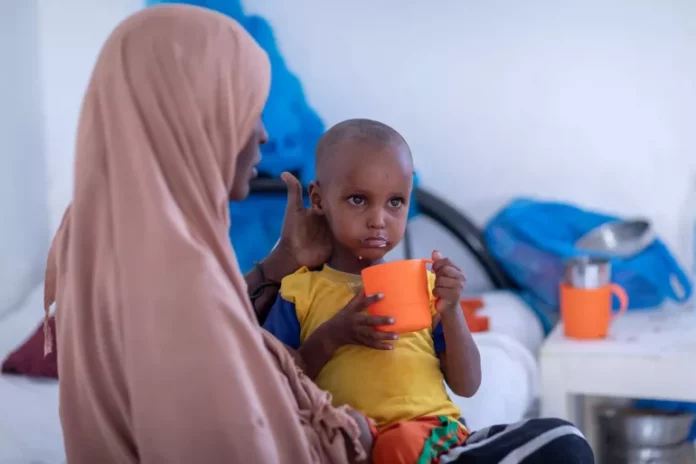MOGADISHU (KAAB TV) – A new UNICEF report reveals a dire situation for children in Somalia, where approximately 63 percent of children are living in severe food poverty, a condition that makes them up to 50 percent more likely to suffer from life-threatening malnutrition.
The findings, detailed in the report titled Child Food Poverty: Nutrition Deprivation in Early Childhood, underscore the urgent need for action as Somalia ranks among the 20 worst-affected countries globally.
The report paints a bleak picture of childhood in Somalia, where inequity, conflict, and the escalating climate crisis have left millions of young lives at risk. Children in severe food poverty consume only two or fewer of the eight essential food groups necessary for proper growth and development.
Shockingly, four out of five children in this dire situation are fed only breastmilk, milk, or a starchy staple like rice, maize, or wheat. Less than 10 percent of these children are provided with fruits and vegetables, while nutrient-dense foods such as eggs, fish, poultry, or meat are part of the diet for less than 5 percent of them.
UNICEF Representative Wafaa Saeed expressed deep concern over the findings, emphasizing the compounded effects of climate-induced crises and ongoing conflicts.
“Child food poverty is a serious issue in Somalia that has been compounded by the cycle of climate-induced crises and conflicts,” she said. “It makes children vulnerable to both chronic as well as severe malnutrition. Together with the government and other partners, we need to do more to improve the food system for young children and enable families to access a wide variety of locally available foods, especially fish, meat, fruits, and vegetables, which are currently limited in their diets.”
The UNICEF report sheds light on the broader global issue of child food poverty, noting that nearly 181 million children worldwide are experiencing severe food poverty, with 65 percent of them residing in just 20 countries, including Somalia.
This East African nation, already battered by years of conflict and environmental challenges, now finds itself at the top of the list in Eastern and Southern Africa.
The report also highlights that over 80 percent of caregivers in Somalia reported that their child had gone an entire day without food at least once, a harrowing statistic that speaks to the scale of the crisis.
Globally, severe child food poverty is most prevalent in poorer households, where income poverty plays a significant role. However, the report also reveals that a staggering 97 million children in relatively wealthier households are affected, largely due to poor food environments and feeding practices.
The aggressive marketing of cheap, nutrient-poor, ultra-processed foods and sugar-sweetened beverages to parents and families is displacing more nutritious and healthier options from children’s diets, exacerbating the crisis.
The UNICEF report calls for immediate and coordinated action to tackle this crisis. It urges governments, development and humanitarian organizations, donors, civil society, and the food and beverage industry to take three key steps:
Transform food systems: Ensure that nutritious, diverse, and healthy foods become the most accessible, affordable, and desirable options for caregivers to feed young children.
Leverage health systems: Deliver essential nutrition services to prevent and treat malnutrition in early childhood, including support for community health and nutrition workers who counsel parents and families on child feeding and care practices.
Activate social protection systems: Address income poverty through social transfers—such as cash, food, and vouchers—tailored to meet the food and nutrition needs of vulnerable children and their families.
UNICEF’s call to action is further supported by the Child Nutrition Fund (CNF), launched last year at the global food security summit in London.
As Somalia and the world grapple with the devastating effects of child food poverty, UNICEF’s report serves as a stark reminder that the future of millions of children depends on immediate and sustained action.
The organization urges governments, donors, and financial partners to support the CNF and prioritize sustainable policies and practices to end severe child food poverty and malnutrition.


